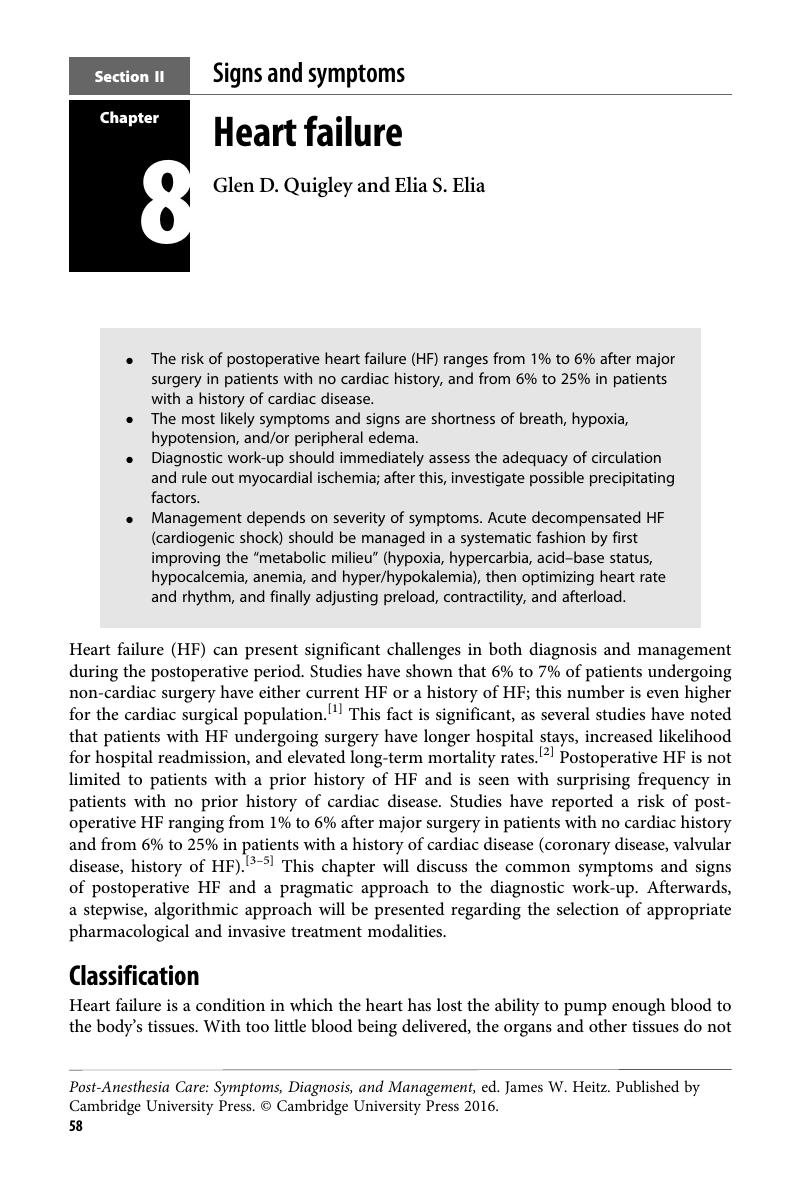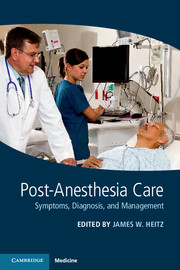Book contents
- Post-Anesthesia Care
- Post-Anesthesia Care
- Copyright page
- Dedication
- Contents
- Contributors
- Preface
- Acknowledgements
- Section I Introduction
- Section II Signs and symptoms
- Chapter 3 Hypertension
- Chapter 4 Hypotension
- Chapter 5 Dysrhythmia
- Chapter 6 Chest pain
- Chapter 7 ECG changes
- Chapter 8 Heart failure
- Chapter 9 Hypoxia
- Chapter 10 Wheezing and stridor
- Chapter 11 Tachypnea and hypopnea
- Chapter 12 Dyspnea
- Chapter 13 Dysphonia and airway trauma
- Chapter 14 Fever, hyperpyrexia, and hyperthermia
- Chapter 15 Hypothermia
- Chapter 16 Hypoglycemia
- Chapter 17 Hyperglycemia
- Chapter 18 Electrolyte disorders
- Chapter 19 Nausea and vomiting
- Chapter 20 Pruritus
- Chapter 21 Weakness
- Chapter 22 Movement disorders
- Chapter 23 Limb paralysis
- Chapter 24 Rigidity
- Chapter 25 Seizure
- Chapter 26 Delirium
- Chapter 27 Headache
- Chapter 28 Delayed emergence
- Chapter 29 Crying
- Chapter 30 Rash
- Chapter 31 Jaundice
- Chapter 32 Visual disturbance
- Chapter 33 Neuropathy
- Chapter 34 Shivering
- Chapter 35 Oliguria and postoperative urinary obstruction
- Chapter 36 Polyuria
- Chapter 37 Abnormal urine color
- Chapter 38 Pain
- Chapter 39 Shoulder pain
- Chapter 40 Anemia
- Chapter 41 Hemorrhage
- Chapter 42 Intraoperative awareness
- Section III Special considerations
- Index
- References
Chapter 8 - Heart failure
from Section II - Signs and symptoms
Published online by Cambridge University Press: 05 August 2016
- Post-Anesthesia Care
- Post-Anesthesia Care
- Copyright page
- Dedication
- Contents
- Contributors
- Preface
- Acknowledgements
- Section I Introduction
- Section II Signs and symptoms
- Chapter 3 Hypertension
- Chapter 4 Hypotension
- Chapter 5 Dysrhythmia
- Chapter 6 Chest pain
- Chapter 7 ECG changes
- Chapter 8 Heart failure
- Chapter 9 Hypoxia
- Chapter 10 Wheezing and stridor
- Chapter 11 Tachypnea and hypopnea
- Chapter 12 Dyspnea
- Chapter 13 Dysphonia and airway trauma
- Chapter 14 Fever, hyperpyrexia, and hyperthermia
- Chapter 15 Hypothermia
- Chapter 16 Hypoglycemia
- Chapter 17 Hyperglycemia
- Chapter 18 Electrolyte disorders
- Chapter 19 Nausea and vomiting
- Chapter 20 Pruritus
- Chapter 21 Weakness
- Chapter 22 Movement disorders
- Chapter 23 Limb paralysis
- Chapter 24 Rigidity
- Chapter 25 Seizure
- Chapter 26 Delirium
- Chapter 27 Headache
- Chapter 28 Delayed emergence
- Chapter 29 Crying
- Chapter 30 Rash
- Chapter 31 Jaundice
- Chapter 32 Visual disturbance
- Chapter 33 Neuropathy
- Chapter 34 Shivering
- Chapter 35 Oliguria and postoperative urinary obstruction
- Chapter 36 Polyuria
- Chapter 37 Abnormal urine color
- Chapter 38 Pain
- Chapter 39 Shoulder pain
- Chapter 40 Anemia
- Chapter 41 Hemorrhage
- Chapter 42 Intraoperative awareness
- Section III Special considerations
- Index
- References
Summary

- Type
- Chapter
- Information
- Post-Anesthesia CareSymptoms, Diagnosis and Management, pp. 58 - 65Publisher: Cambridge University PressPrint publication year: 2016



